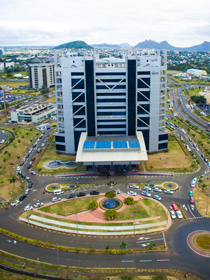Publicité
Tomorrow, today


The world economy entered an era of high and sustained economic growth in the twentieth century as a result of the technological advancements and the considerable spillovers of the Industrial Revolution. Despite the occurrence of two world wars, world GDP per capita quintupled, with rapid growth resulting mainly in the 1960s during post-war reconstruction. The advent of globalisation and the increase in the volume of international trade following the blurring of national boundaries further ensured that the progress was sustained for several more years.
This fuelled raucous confidence in neoclassical economic theory, with its success easily breeding a pool of avid believers in the invisible hands of demand and supply. So, to the rapturous delight of neo-classical economists, Governments allowed markets to freely operate their forces, often turning a blind eye to the excesses that such systems can cause to economies.
This conjecture led to economies and businesses being fueled by greed, with endeavors going further and further in testing the soundness of the system which, when first proposed by Adam Smith in his seminal book- commonly known as “The Wealth of Nations”, had at least some interesting and credible underpinnings. Inevitably this disregard for safeguards resulted in the crisis of 2009, which prompted a need for an introspection of neoclassical economic theory and a questioning of the relevance of certain orthodox economic systems.
The crisis had in fact burst a bubble encouraged by economists ensnared by the beauty of laissez-faire which posited that a spontaneous equilibrium of the market does not need any economic action or the intervention of the state.
The diagnosis that ensued was simple and quite easily identified. In the absence of proper planning, guidelines, safeguards and regulations, the global economy was allowed to go astray and ultimately collapse without appropriate safety nets.
These in fact should have emanated from the prerogatives of the state, and, in the end, it was rightly recognized that laissez-faire is not as flawless as it was thought to be and that the beliefs centered around the theory were fallacious.
What also transpired was that the imputed conviction that the economy should be left exclusively to economists no longer stood, especially keeping in mind the rising complexities of trends, information and solutions.
Choosing to remain oblivious of the fact that we cannot understand this new world with the same knowledge as in the past and that the economy is not simply the confrontation of supply and demand will leave economics at the state of an autistic discipline, locked in on itself and cut off from other forms of knowledge. It is not enough to exploit the traditional factors of development that are supposed to be governed by the perfect laws of the market. Man should be at the center of concern, and homo economicus is not rational.
As Friedrich Hayek, the Austrian philosopher and economist, said, “An economist who does only economics is not a good economist". The intersection of economics with psychology and sociology leads us to the idea that it is essential to regulate the capitalist system to create a more united and more just society.
Economic planning and Mauritius
For Mauritius, the Prime Minister has aptly recognized the need to have research based policy measures and a well-formulated strategic plan for the economy, announcing the creation of an Economic Development Board to oversee this monumental task.
Whether we like it or not, our island remains vulnerable and sensitive to external shocks, and future development will not be linear or smooth either. It will certainly be subject to a lot of unforeseen shocks.
The best we can do is to mitigate these risks and absorb exogenous shocks. In fact, to fuel our ambition of becoming a high-income economy and improve on our decades of sustained economic growth, there is the overwhelming need to do things differently, and this will require other resources, a change in mindsets, and the adoption of innovative methods adapted to the global trends.
Indeed, the world has undergone a radical transformation in the last decade, with the advent of developments in terms of internet of things, interconnectedness of machines, artificial intelligence, blockchain and big data, providing intricacies and opportunities that economists cannot on their own fully exploit.
The analysis of these can become instrumental in instituting a new methodology of studying social groups, offering an unprecedented capacity for forecasting trends and behaviors.
The Economic Development Board (EDB) with all the freshness it will bring to the Mauritian economic policy making landscape could rein in the opportunities that these present. It should be much more than simply bringing back economic planning as conducted by the defunct Ministry of Planning and Economic Development, which was afterwards integrated into the Ministry of Finance in 2005. Nor should it be a simple merger of institutions.
Democratization of planning
For the newly created institution to be more than the sum of its parts, there are several areas where deeper reflection would generate more sustainable dividends. For that to happen, a real democratization of planning is needed, one that will presuppose going beyond a purely economic framework and adopting a multidisciplinary approach to development that would capture the complexity of societal problems paced within a wider social, political and economic context.
First and foremost, there needs to be open and free access to information, not only to the staff of the EDB but also, and especially, to the members of the wider public. Today, the reports and data of countless experts lay dormant in the drawers of ministries and parastatal bodies, gathering dust and mites instead of generating new ideas.
The democratization of planning will thus require a new model of open data including the rich database and knowledge accumulated for consultation, from the student to the researcher.
Allowing this access to information will be critical to the success of economic planning by encouraging the use the modern data analysis tools such as big data and machine learning to produce predictive analyzes by those who know better, such as engineers, statisticians, or mathematicians. These would better suit our targets of explaining the hidden causes and trends of different actions, and therefore favor prediction of future systemic risks.
This empiric-based policy-making has not been much utilized in the recent years, nor have measures announced in the budget relied on facts or evidences.
One of the reasons why we are having a mushrooming of real estate projects for instance resides in the fact that in the absence of reliable data to conduct market research, there has been a false sense of confidence that such ventures are highly profitable and would provide quick returns. Therefore, open access to data would help investors when making investment decisions, and choose which sectors are most sustainable.
This state of affairs can further be illustrated with a simple case study of the ever-increasing frequency of road accidents in Mauritius. There has, to the best of my knowledge, not been any empirical study of road accidents through models using geographic information systems to identify high-risk sites. Better road risk management in our towns and villages can go through a study of the mapping of the "geolocation" of traffic accidents. Through such a mapped layout of accidents (fatal or not) during the last 20 years, we could identify dangerous places and diagnose security threats as well as the risk factors. The on-ground observations of inhabitants in such localities could also be considered.
A precise and reliable spatial database on accidents, and its integration within a system that includes other information such as age of the driver, marks and ages of vehicles will guarantee good identification of dangerous places as well as transform into a useful tool for accident prevention. The public will, on projects of such social importance, certainly influence policy through analyses and contributions that would escape even the best of data analysts.
This democratization of planning to the public not only allows the obtention of improved information but also generates a debate around subjects of national and strategic importance, involving more people’s interest in policy making. This becomes a central national platform that diffuses the work being undertaken. It is also a matter of pride for citizens to contribute actively in policy making and bridges an opaque gap that exists between the forbidden corridors of Ministries and the common man.
Adopting a participative approach
As part of the 2015-16 budget consultations, we had launched the MauritiusFinance.com initiative, which encouraged the participation of all Mauritians in the development of budget measures. The electronic platform was warmly welcomed by the population and the ideas harvested produced certain interesting initiatives and projects in this respect.
The EDB could consider adopting similar new participatory and inclusive planning models that would target the participation and collaboration of all civil society using new communication technologies to network with all components of the population. It could also be an important vehicle in channeling information and knowledge, and provide everyone with the tools to conduct their own economic and social research.
The new model of participatory planning can use the ideas of the public, but should also draw on the experience of those already involved in public policy to determine whether, for any proposed measure, the expected impact is in keeping with the facts and the lived experience of citizens.
Thus, for this democratized planning model to function correctly, and forever change the way in which economic and social policies are designed, planned and tested, there is the need to include ministries and parastatal bodies in the process.
The EDB cannot and should not take the entire burden of planning, and must not be viewed as a dumping ground for every whims and caprices of ministries. Every government institution should contribute equally, if not more, to the planning exercise. The EDB should be responsible for the overall strategy, while government institutions should be coming up with specific projects and implementing them insofar as they are aligned with the strategies formulated by the EDB.
However, the biggest challenge here is to radically change the way they have been involved in policy-making for several years now.
Implementation and monitoring
The current process has been the subject of many articles by myself and contributors of Mauritius Finance. Line ministries and parastatal bodies have been sending their budget requirements to the Ministry of Finance and Economic Development, inflating their figures marginally year after year without being required to show that their previous funds allocated have been disbursed in concretizing projects or not.
This has resulted in the stockpiling of measures and projects, with ministries continuously sending new projects when previous ones have not been completed. In the pursuit of the flavor of the day, it is often seen that projects initiated in a year are left halfway to start on new ones that will inevitably fall prey to the same conditions.
It is shocking that since independence very few government programmes and projects are assessed methodically and formally, when planning involves carrying out regular audits and evaluations of policies to evaluate the effectiveness of development actions, particularly to avoid white elephants and the waste of scarce public resources.
For many years we have formulated countless schemes, subsidies and incentives, be it fiscal or otherwise, to promote both new and existing industries. All such measures have rarely, if ever, been the subject of serious and rigorous evaluations or impact studies whereas their examination should have been under scrutiny before more is given to these sectors, the whole economy or even if it applies to an enterprise only.
We have also been guilty of signing treaties and agreements on trade, taxation or investment without properly assessing the real consequences on our economy. We have signed the MLI without quantifying the costs and the benefits, we are engaging in FTA discussions with China, which will inexorably open the floodgates to cheap imports, while proclaiming our ambition to increase the manufacturing sector’s contribution to the economy to 25% of GDP. This is a clear contradiction of policy, one which needs to be corrected rapidly.
Adopting rigorous planning and established project evaluation methods is one of the surest ways of curbing excesses that only do harm to our public debt. Indeed, in the absence of formal methods of evidence based project selection and evaluation, public debt can become one of the biggest enemies of an economy. I’ll take the example of Singapore which has a public debt equivalent to 105% of GDP. Nevertheless, the fears of an excessive level of public debt there are quasi inexistent. This is simply because in Singapore there are no white elephants like those that exist in Mauritius. The beautiful Belle Mare Tourist Village built at the cost of Rs 250 million and the equally impressive Rose Belle Business Park built at the cost of Rs 350 million are today standing tall, but remain for all intents and purposes completely vacant. No transport infrastructure, no market study, no considerations for developments in their proximity. All such considerations have all been neglected in the pursuit of realizing projects just for the sake of fulfilling announcements.
Today, the Government has embarked on another project of massive proportion- the Metro Express.
Most of the Metro Express stops will be surrounded by high-density mixed-use areas to encourage private developments around stations. However, the success of the Metro Express will require a densification of cities that it will service. Better planning and coordination will be essential between transport and urban planning for the success of the Metro Express project.
Such considerations have been absent in the transport and urbanization debate until now. If we glance over our shoulders, the last fifty years have been dominated by the development of roads, bypasses and flyovers without a real vision on the value of urbanism, the sharing of roads by pedestrians, old people, children, the disabled and motorists. Worse, there was never even the slightest need felt that a better coordination of transport and town planning was needed. Even scarcer were discussions around new concepts such as traffic calming policies or densification of cities.
Moreover, the scarcity of the soil, the protection of agricultural spaces, the regeneration of our aquifers will require a more profound reflection and especially a better coordination on the articulation of our transport policy and the urban development policy.
These topics are increasingly seeping into the political debate and in the mainstream. In this, it becomes more important that the right arguments are put forward to obtain the very best solutions in terms of coordinating transport development and urbanism while reducing the unnecessary and negative impacts of erroneous, and yet convincing, backlash of detractors.
Working sessions centered on the topic of “Transport and Urbanism” for instance could help us to identify the economic, environmental and social benefits of transport and urban policy integration and to identify avenues on how to promote institutional coordination and provide the right legislation for sustainable development. England, for example, has comprehensive national planning guidelines that support the principles of sustainable development, densification and public transport.
The strength of institutions
In organizing such thinking exercises, there needs to be the robust backing of stronger institutions.
Planning can hardly ignore the importance and influence of institutions for the economic growth of the Republic of Mauritius. However, there is space to expand our concept of what are the “institutions” (Different organizations and bodies) to conform to the definition developed by economist North Douglas, who was awarded the Nobel Prize in 1993.
Succinctly, he described institutions as “the constraints established by men that structure human interactions. They consist of formal constraints (such as rules, laws, constitutions), informal constraints (such as standards of behavior, conventions, imposed codes of conduct) and characteristics of their application.”
He goes further in saying that “Institutions are the rules of the game in society or, more formally, are the humanly devised constraints that shape human interaction. In consequence they structure incentives in human exchange, whether political, social, or economic.”
Douglas North has demonstrated that the existence of institutions with well-defined functions stimulates the development of investment, fosters innovation and technological adoptions and encourages economic growth while introducing beneficial dynamism into the economic development process in general.
Knack and Keefer (1995) on the other hand used relevant indicators for measuring the quality of economic institutions and showed empirically that countries that have higher rates of economic growth are those with better institutions. Dani Rodrik and Arvind Subramanian (2003) go as far as claiming that “if Bolivia acquired institutions of the quality of that of South Korea, its GDP would be close to $ 18,000 rather than at its then current level of $2,700”.
Since then, several other studies have proved the existence of a positive correlation between economic growth and the quality of institutions, including the strength of the rule of law, the degree of corruption, the right to property, the quality of government as well as other criteria of governance.
Several international organizations such as the IMF or the World Bank have been giving much importance to the institutional setup in reforming economies, with an emphasis on the proper definition of property rights. These should aim at minimizing market power abuses, internalize externalities, solve information asymmetry problems, and establish quality and product safety standards (Rodrik, 2005). Through careful planning, an overhaul of our regulatory institutions to facilitate the market entry of entrepreneurs (local or international) in innovative and dynamic sectors can be favored while avoiding companies that are only interested in rent-seeking activities.
One of the tasks of planning would therefore be the development, together with the various stakeholders, of an economic development strategy based on institutional reform as well as the analyzing of factors likely to favor such reforms in Mauritius.
In fact, Mauritian institutions should not be viewed as physical organizations, but as the set of rules of the game. Reform in this optic will therefore involves a multidisciplinary approach involving law, economics, political science and sociology.
Such reforms, based on rationalization principles, would go a long way in providing investors with the appropriate comfort in terms of protection of investment, absence of discrimination and rapid resolutions of conflicts and encourage them to increase their investments.
Enabling the paradigm shift
This paradigm shift can only happen if the EDB and its personnel are well trained in foresight analyses, which includes a range of approaches that combine the following three components:
- futures (forecasting, forward thinking, prospective),
- planning (strategic analysis, priority setting), and
- networking (participatory, dialogic) tools and orientations.
Often done at a higher level, based on devising overarching strategies rather than indulging in the micro-aspects of its implementation, they are principally used to influence policy.
Foresight consists of anticipating possible events to illuminate the present action in the light of possible and desirable futures. The prospective attitude is not to wait for the change and then react, but rather to influence the expected change by being proactive.
We can safely assume that, so far, the Republic of Mauritius has little practiced foresight or planning. However, the future is not written but remains to be built. And there is not one future for the Republic of Mauritius but several futures possible.
We all remember the collective surprise following the bringing down of the Berlin Wall, or the shocks following September 11, 2001 in New York, or even the Arab Spring. We still remember vividly the collapse of Wall Street and the contagion that built into the financial crisis of 2008. More recently we have had the oil price shock three years ago when no one imagined that the price of the commodity would be below even $ 150 per barrel. We have been caught off guard by other unanticipated events like Brexit as well.
As always, we were unprepared to face these issues and their implications for our economy. Our reflex has always been to seek the support, at high costs, of so called international experts who know very little on the intricacies of our economy.
Given these, it is important that we develop in-house skills as we will constantly be facing such disturbances. Mauritius, with an economy open to the world, will face enormous challenges and major external risks that can have a significant impact on its socio-economic development.
Our tourism industry, our export markets, and our foreign direct investments remain highly dependent on our main economic partners such as France, Great Britain, the United States, India, China, and South Africa.
With so many variables in the equation, planning should therefore not be limited to reactivity in the event of a crisis but should be able to identify opportunities and prepare alternative strategic choices that will maintain the stability of the Mauritian economy.
Thus, the team of the EDB should need all technological resources and should be well trained in macro-economic modeling to analyze critical socio-economic issues. Already, certain areas that could be explored include the ageing population and the need for a pensions system reform, sustainable development, labour market mismatch amongst others.
All research nonetheless should serve a purpose, and the recommendations therein should be applied. Only then will the EDB gain in credibility.
In doing this planning exercise, it is important that the authenticity of Mauritius and its culture is taken into consideration and all the best endeavors are taken to ensure their preservation. We have a unique identity, and it is not by copying wat others are doing that we can achieve our objectives. We have gone far we what we have, and it is our very strengths that will help us go further.
We should not suppose palpable results quickly. Such expectations could well be our wrongdoing. Planning takes time, and implementation longer. As Warren Buffet has said, "Someone is sitting in the shade today because someone planted a tree a long time ago.” We have to be patient, provide room for failures, learn from our mistakes, and build the Mauritius that we deserve.
Publicité
Les plus récents






